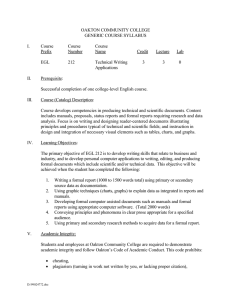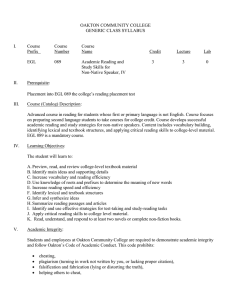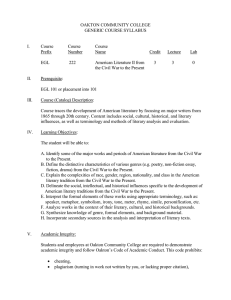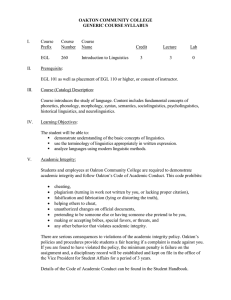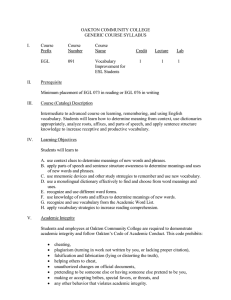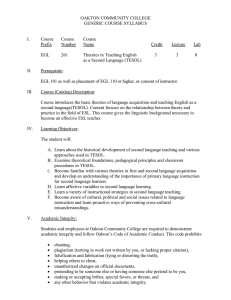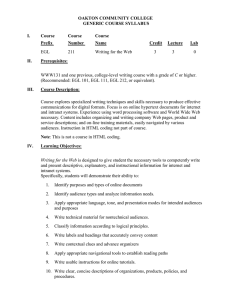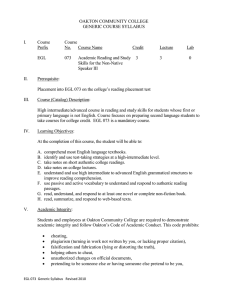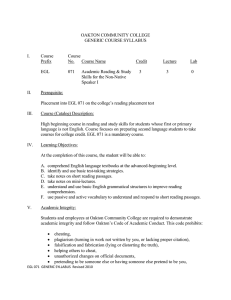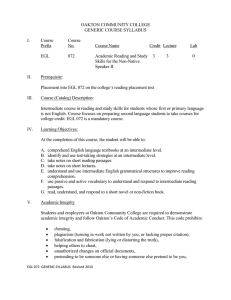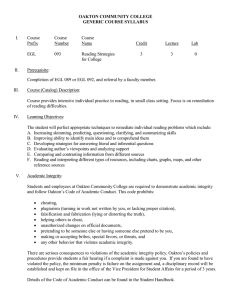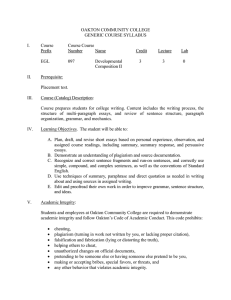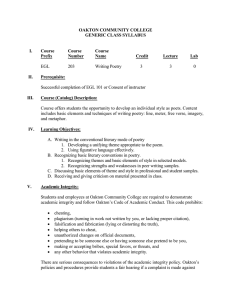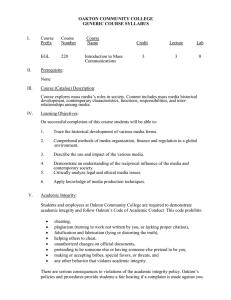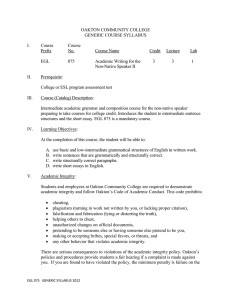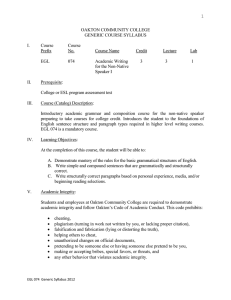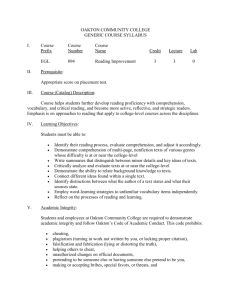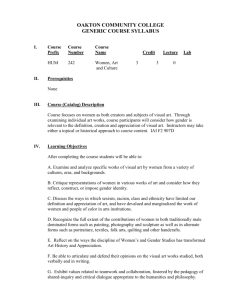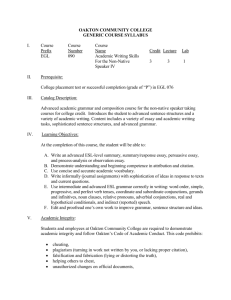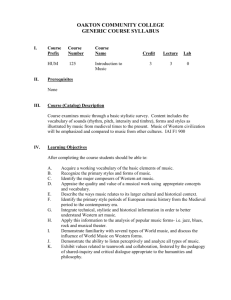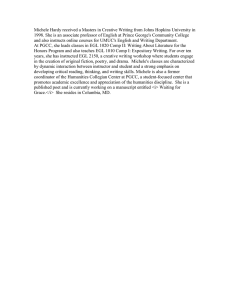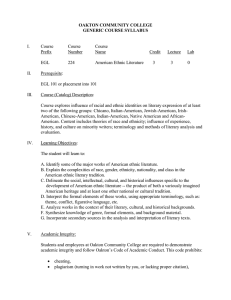Oakton Community College
advertisement
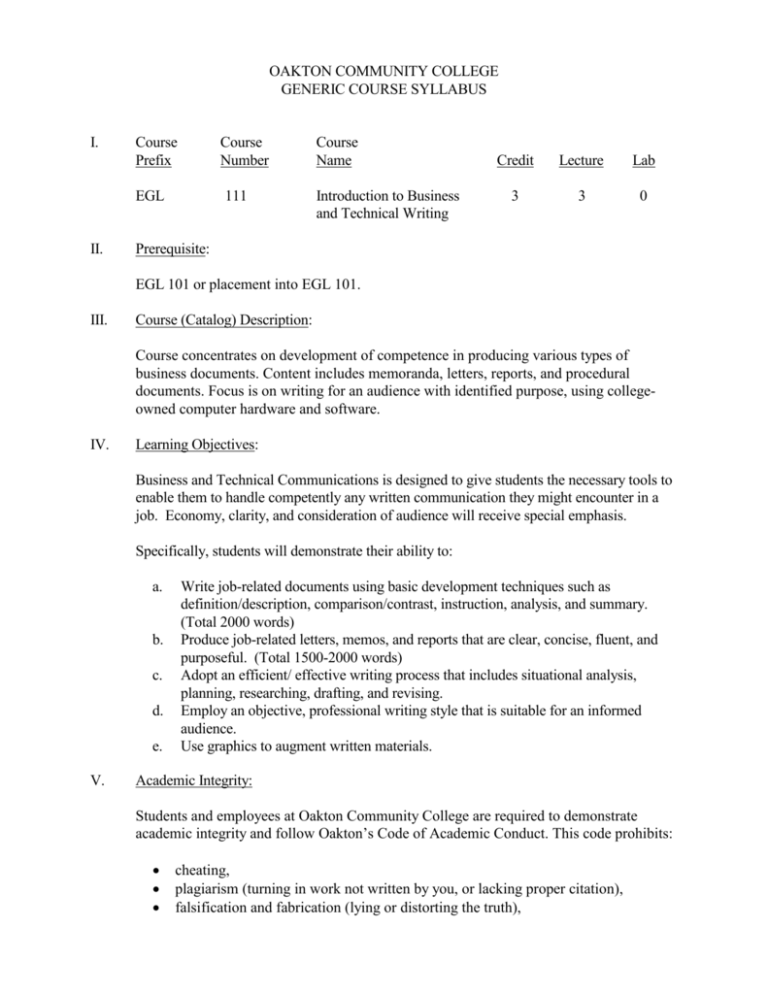
OAKTON COMMUNITY COLLEGE GENERIC COURSE SYLLABUS I. Course Prefix Course Number EGL II. 111 Course Name Introduction to Business and Technical Writing Credit Lecture Lab 3 3 0 Prerequisite: EGL 101 or placement into EGL 101. III. Course (Catalog) Description: Course concentrates on development of competence in producing various types of business documents. Content includes memoranda, letters, reports, and procedural documents. Focus is on writing for an audience with identified purpose, using collegeowned computer hardware and software. IV. Learning Objectives: Business and Technical Communications is designed to give students the necessary tools to enable them to handle competently any written communication they might encounter in a job. Economy, clarity, and consideration of audience will receive special emphasis. Specifically, students will demonstrate their ability to: a. b. c. d. e. V. Write job-related documents using basic development techniques such as definition/description, comparison/contrast, instruction, analysis, and summary. (Total 2000 words) Produce job-related letters, memos, and reports that are clear, concise, fluent, and purposeful. (Total 1500-2000 words) Adopt an efficient/ effective writing process that includes situational analysis, planning, researching, drafting, and revising. Employ an objective, professional writing style that is suitable for an informed audience. Use graphics to augment written materials. Academic Integrity: Students and employees at Oakton Community College are required to demonstrate academic integrity and follow Oakton’s Code of Academic Conduct. This code prohibits: cheating, plagiarism (turning in work not written by you, or lacking proper citation), falsification and fabrication (lying or distorting the truth), Generic Course Syllabus EGL 111 Page 2 helping others to cheat, unauthorized changes on official documents, pretending to be someone else or having someone else pretend to be you, making or accepting bribes, special favors, or threats, and any other behavior that violates academic integrity. There are serious consequences to violations of the academic integrity policy. Oakton’s policies and procedures provide students a fair hearing if a complaint is made against you. If you are found to have violated the policy, the minimum penalty is failure on the assignment and, a disciplinary record will be established and kept on file in the office of the Vice President for Student Affairs for a period of 3 years. Details of the Code of Academic Conduct can be found in the Student Handbook. VI. Sequence of Topics: a. Communications theory (audience/purpose), and word processing b. Planning, organizing, and editing written documents within the business environment. c. Memos and letters: accepted formats, organization, tone, constructing the three-part document. d. Achieving Clarity: reader-centered approach, precision of language, logic (paragraphing, sectioning, and sentence construction). e. Writing for specific purposes: letter/memo portfolio (series) f. Conciseness: recognizing padding, redundancies, and over-use of subordination and prepositional phrases. g. Recognizing and using appropriately passive and active voice. h. Observing, noting, analyzing, and describing a process. Designing and using flow charts. i. Describing a mechanism with text, illustration and headings. j. Writing the informal report (progress) and integrating tabular material. k. Using subordination, coordination, and transitional elements to achieve emphasis and fluency. l. Researching, planning, designing, and writing the recommendation report as a team. m. Writing a proposal -- purposes, elements and design. n. Researching, planning, designing and writing a feasibility study or operations manual. Writing mechanics will be reviewed as needed during the semester. VII. Methods of Instruction: Course may be taught as a face-to-face, media-based, hybrid, or online course. D:\106740695.doc Generic Course Syllabus EGL 111 Page 3 Lectures, discussions, writing exercises, film and other media will be used to introduce and clarify principles of technical composition and to familiarize students with basic AV and business equipment. VIII. Course Practices Required: A. Completing and submitting acceptable versions of all written assignments is required. B. All assignments (except "exercises") will be typed, using acceptable memo, letter, or report format. C. Preliminary proposal, bibliography, and outline for final project must be turned in prior to deadline for final project. IX. Instructional Materials: Note: Current textbook information for each course and section is available on Oakton’s Schedule of Classes. The Rinehart Guide to Grammar and Composition Writing That Works (Third Edition) X. Methods of Evaluating Student Progress: Instructor evaluation of student writings and exercises and quizzes. Team member evaluations of individual contributions to collaborative assignments. XI. Other Course Information: -Attendance policy -For whatever information/procedures the instructor holds the student accountable. If you have a documented learning, psychological, or physical disability you may be entitled to reasonable academic accommodations or services. To request accommodations or services, contact the Access and Disability Resource Center at the Des Plaines or Skokie campus. All students are expected to fulfill essential course requirements. The College will not waive any essential skill or requirement of a course or degree program. Effective beginning term: Fall 2013 Ending term: Syllabus prepared by: Date: Revised by: Date: March 2007 Maureen Douglas Reviewed by Chair: Lynn Woodbury Date: March 2007 Approval by Dean: Linda A. Korbel Date: June 2013 D:\106740695.doc
